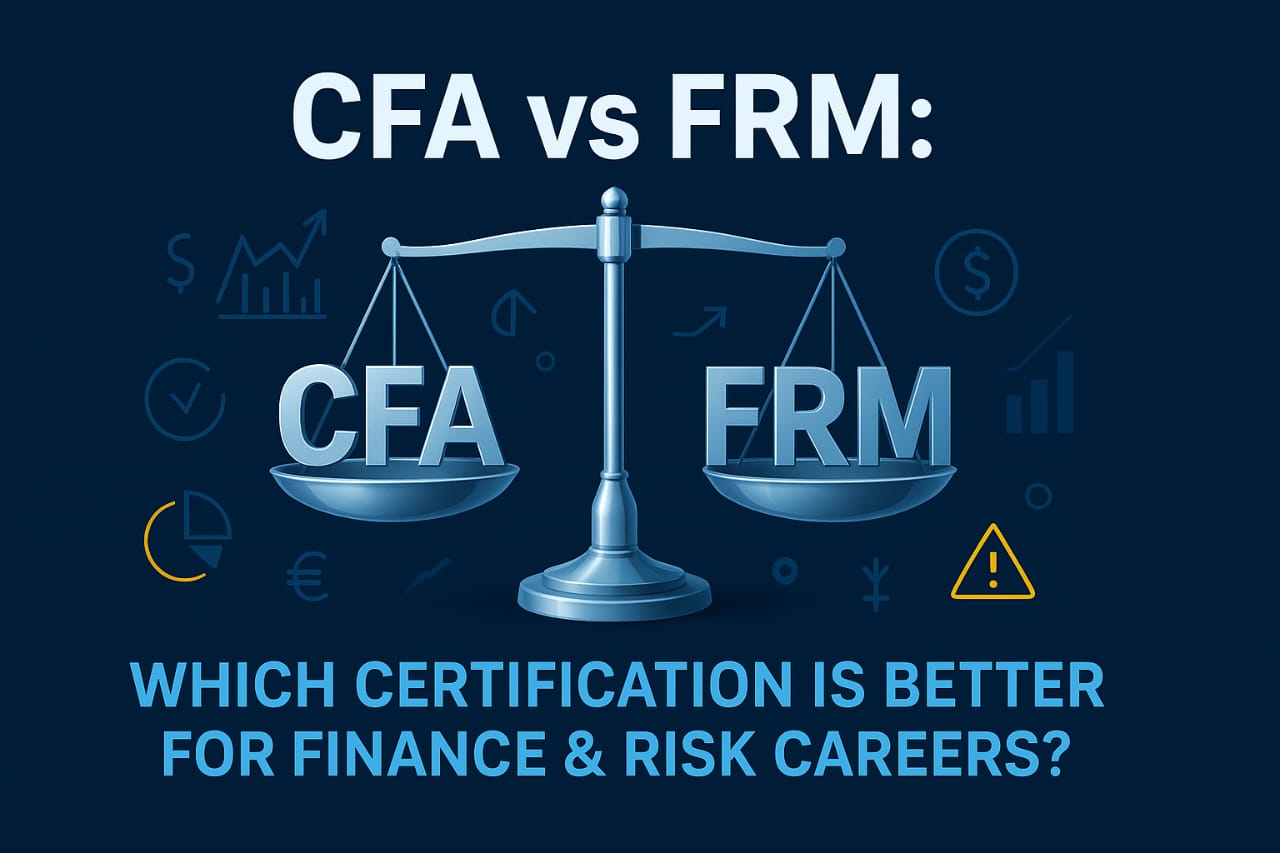
Blog
CFA vs FRM: Which Certification is Better for Finance & Risk Careers?

When it comes to advancing in finance and risk management, two certifications stand out: FRM (Financial Risk Manager) and CFA (Chartered Financial Analyst). Both open doors to global opportunities, but the right choice depends on your career goals. In this article, we’ll compare CFA vs FRM in 2025, including their difficulty levels, salaries, job prospects, and scope in India & abroad.
Difference Between CFA and FRM
While CFA vs FRM is often debated, they focus on distinct areas:
- CFA (Chartered Financial Analyst): Best known for investment analysis, portfolio management, and corporate finance.
- FRM (Financial Risk Manager): Specialises in risk management, credit risk, market risk, and operational risk.
- If you aim for investment banking, portfolio management, or equity research, CFA is the go-to.
- If your passion lies in risk assessment, modelling, or consulting, FRM is ideal.
Both certifications complement each other and, when combined, significantly boost professional credibility.
CFA vs FRM Difficulty
Both CFA and FRM exams are challenging, but in different ways:
- CFA Exam Difficulty (2025): The three-level test broadens finance knowledge. Requires long-term commitment (3-4 years).
- FRM Exam Difficulty (2025): Two levels with a heavy focus on quantitative risk management. Candidates often complete FRM faster (1-2 years).
CFA vs FRM Pass Rate: CFA averages ~40-45% per level, while FRM varies between 45-55%.
CFA vs FRM Salary
Earning potential is a major factor in choosing between CFA and FRM:
| Certification | Avg. Salary (Global) | Common Roles |
|---|---|---|
| CFA | $70,000 – $180,000+ | Portfolio Manager, Equity Analyst, Investment Banker |
| FRM | $75,000 – $150,000+ | Risk Manager, Credit Risk Analyst, Quantitative Analyst |
In India (2025):
- CFA charterholders: ₹8–20 LPA
- FRMs: ₹10–18 LPA
CFA vs FRM Career Prospects
- CFA Careers: Investment banking, asset management, hedge funds, equity research.
- FRM Careers: Risk consulting, market/credit risk analysis, treasury, compliance.
Many professionals pursue both CFA and FRM to maximise career opportunities across finance and risk management.
CFA vs FRM in India (2025)
The demand for certified professionals is rising across banking, fintech, and consulting.
- CFA in India: Valued in equity research, investment banking, and asset management (Mumbai, Delhi, Bangalore).
- FRM in India: High demand in risk management teams of banks, NBFCs, Big 4 firms, and regulators.
Both enjoy strong recognition in India & abroad.
CFA or FRM for Risk Management?
If risk management is your core focus, FRM is tailor-made. However, CFA holders also work in risk roles, especially when combined with FRM. Many professionals opt for both CFA and FRM for versatility.
CFA and FRM Together: Suggested Sequence
Many professionals today choose to pursue both CFA and FRM for maximum career flexibility. If you’re planning to do both, here’s a recommended sequence:
- Start with FRM Level 1: Builds a strong foundation in risk management concepts.
- Then take CFA Level 1: Covers investment analysis, financial reporting, and ethics.
- Move to CFA Level 2: Focuses on valuation, advanced financial analysis, and application of concepts.
- Attempt FRM Level 2: Deepens expertise in risk models, market risk, credit risk, and operational risk.
- Finally, complete CFA Level 3: Concentrates on portfolio management, wealth planning, and integrating all knowledge.
Why follow this order?
- FRM Level 1 provides quantitative and risk fundamentals that support CFA studies.
- Alternating between CFA and FRM balances workload while keeping the knowledge flow relevant.
- Completing both designations gives you a strong mix of investment management (CFA) and risk management (FRM) expertise.
Outcome: Following this sequence can open better job opportunities in investment banking, risk management, portfolio management, consulting, and asset management, since employers value professionals who understand both returns and risks in finance.
Watch our detailed breakdown here: CFA + FRM Study Plan Explained
Final Word: CFA vs FRM: Which Certification is Better in 2025?
Both CFA and FRM are prestigious, globally recognised, and respected in the finance industry. Your choice depends on whether you want to focus on investments (CFA) or risk management (FRM).
If you want to build expertise in both areas, pursuing both will give you a competitive edge.
At Fintelligents, we provide structured, expert-led training for both the FRM Course and CFA Online Course, helping candidates clear exams with confidence and launch successful careers.
Ready to take the next step in your finance career? Enrol with Fintelligents today.
FAQs on CFA vs FRM in 2025
Q1 : CFA vs FRM: Which is better?
Ans: Neither is universally “better.” CFA is broader, FRM is more risk-specialised. The choice depends on career goals.
Q2 : Can I do CFA and FRM together?
Ans: Yes. Many professionals pursue both to gain expertise in investments and risk.
Q3 : CFA vs FRM job opportunities: which offers more?
Ans: CFA opens more investment-related jobs, while FRM dominates in risk-focused roles. Both lead to global opportunities.
Q4 : What is the CFA vs FRM pass rate?
Ans: CFA: ~40-45% per level.
FRM: ~45-55% depending on the level.
